Your Up-to-Date Guide on the WP Engine vs WordPress Feud
If you click to purchase a product or service based on our independent recommendations and impartial reviews, we may receive a commission. Learn more
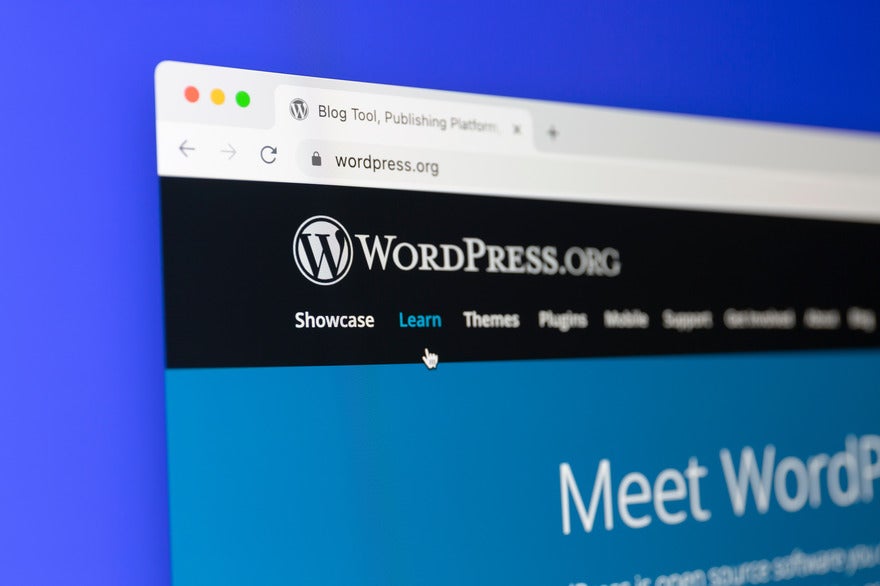
At the start of September, the relationship between WordPress co-founder and Automattic CEO, Matt Mullenweg, and the WordPress hosting provider, WP Engine, started to crumble. Since then, accusations have been thrown, users banned, and a federal lawsuit has been filed.
I’ll keep this page up to date with the latest news and you can read our additional stories about what went wrong between WordPress and WP Engine, as well as our advice on whether WP Engine users should switch platforms.
Timeline of Key Events in 2024
Here’s what we know about the WP Engine vs WordPress feud so far, with the most recent developments at the top:
➡️ October 12, 2024: WordPress takes over popular WP Engine plugin
The latest development saw WordPress take over a WP Engine-owned plugin to “remove commercial upsells and fix a security problem,” according to Matt Mullenweg in a WordPress blog post. However, the Advanced Custom Fields (ACF) plugin team said this action – known as forking – was done without consent.
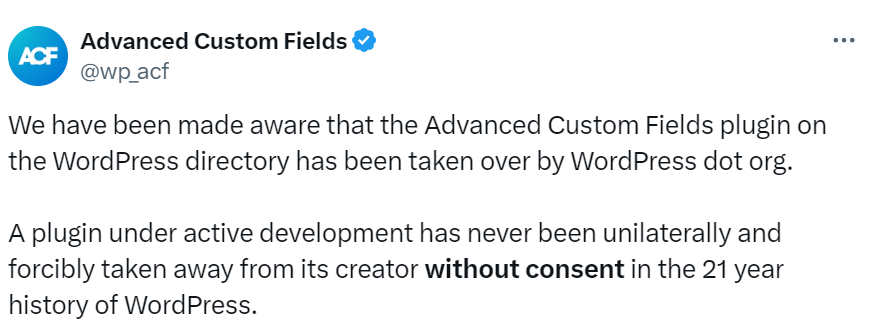
The ACF plugin – a widely used plugin for WordPress users – was first acquired by WP Engine in 2022. Unfortunately, things have clearly soured due to the WordPress and WP Engine drama, putting the plugin at risk. The ACF plugin team released a statement to express their thoughts:
“Mullenweg’s actions are extraordinarily concerning and pose the grave risk of upending and irreparably harming the entire WordPress ecosystem.”
It certainly sets a scary precedent and highlights how much power Mullenweg exerts over the future of WordPress.
➡️ October 9, 2024: WordPress.org introduces checkbox to contributor login page
The WordPress team added a new checkbox to the contributor login page on WordPress.org. This asks people signing in to confirm they’re “not affiliated with WP Engine in any way, financially or otherwise.”
The move caused some confusion in the community, resulting in WP Engine having to explain that its customers, agencies, and users, are not affiliated with WP Engine and are free to proceed with the login process. Even WordPress responded to ask for clarification on select cases, only contributing to the confusion even more, considering WordPress is the one to introduce the checkbox in the first place.
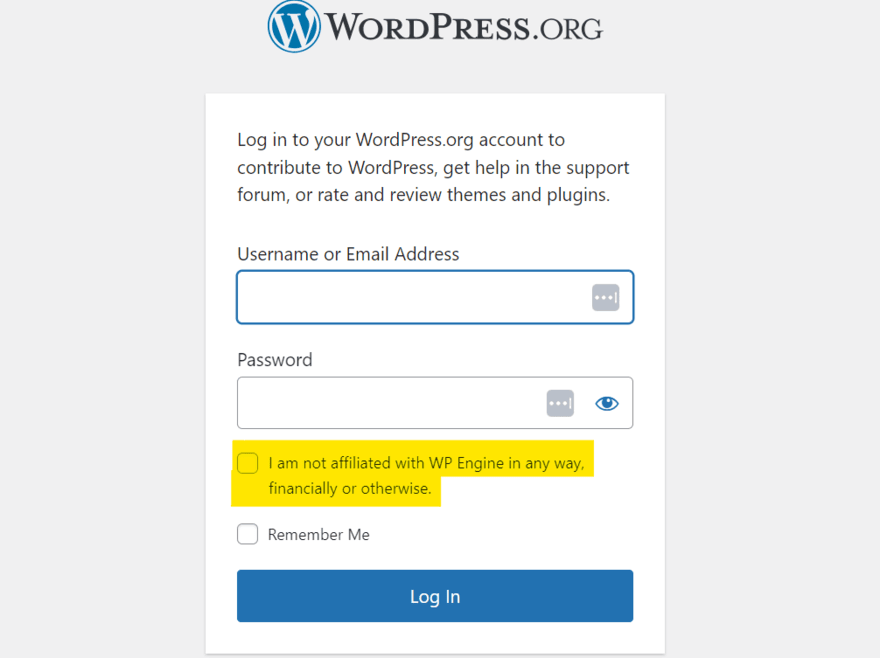
➡️ October 3, 2024: Automattic pays employees to leave if they disagree with Mullenweg’s actions
Following the back-and-forth between the two companies, Mullenweg decided to give employees an out if they disagreed with his actions against WP Engine. And, to be fair to Mullenweg, the package was very generous. Employees at Automattic could choose to resign – losing eligibility for future roles at the company – and receive either $30,000 or six months of salary, whichever was the highest amount.
Automattic shared that 159 people took the offer, equating to just over 8% of the company.
➡️ October 2, 2024: WP Engine files federal lawsuit
WP Engine filed a lawsuit against Matt Mullenweg and Automattic at the start of October, addressing the “abuse of power, extortion, and greed”. It’s not too surprising that the feud developed into legal action considering the severity of insults and retaliation.
WP Engine shared the news of the lawsuit on X, expressing its concern for the future of the WordPress community:
“Matt Mullenweg’s conduct over the last ten days has exposed significant conflicts of interests and governance issues that, if left unchecked, threaten to destroy that trust. WP Engine has no choice but to pursue these claims to protect its people, agency partners, customers, and the broader WordPress community. Like so many of you, we love WordPress and are committed to the stability and longevity of the community.”
WordPress responded to the X post, which you can see in the image below. Arguably, the company’s decision to publicly respond to its arch-nemesis only serves to stir the pot by making light of the situation.

Automattic also issued a more serious response to the “baseless lawsuit against Automattic, Matt Mullenweg, and WordPress.org.” The blog post goes on to say that Automattic “vehemently deny WP Engine’s allegations–which are gross mischaracterizations of reality–and reserve all of our rights.”
➡️ October 1, 2024: WordPress reinstates WP Engine ban
After the pause, WordPress once again removed access to its resources for WP Engine users. Thankfully, for WP Engine customers, WP Engine was prepared for the switch off this time around and rolled out solutions quickly.
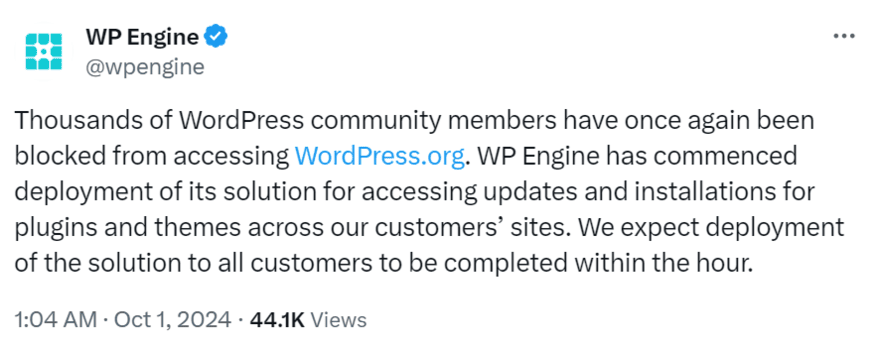
➡️ September 27, 2024: WordPress temporarily lifts ban on WP Engine users
WordPress temporarily lifts its ban on WP Engine customers after two days of frustration and confusion. Mullenweg posted on the WordPress blog after access was restored to WP Engine users, placing the blame for the disruption solely on WP Engine’s shoulders – despite WordPress being the ones in charge of the ban.
➡️ September 25, 2024: WordPress blocks WP Engine users
Things continued to heat up after Mullenweg banned WP Engine users from accessing WordPress.org resources, such as themes and plugins.
WP Engine responded to the decision on X:
“Matt Mullenweg, CEO of Automattic, has misused his control of WordPress to interfere with WP Engine customers’ access to WordPress.org, asserting that he did so because WP Engine filed litigation against WordPress.org. This simply is not true. Our Cease & Desist letter was a letter – not a lawsuit – and was directed at Automattic for Matt’s pattern of serious and repeated misconduct – behavior that must stop for the health and stability of the entire community.
Matt Mullenweg’s unprecedented and unwarranted action interferes with the normal operation of the entire WordPress ecosystem, impacting not just WP Engine and our customers, but all WordPress plugin developers and open-source users who depend on WP Engine tools like ACF. We are taking immediate steps to remediate the impact of this action. We remain steadfastly committed to supporting WP Engine customers, users, and the entire WordPress community.”
Unfortunately, this move impacted regular users, and not just WP Engine as a company.
➡️ September 24, 2024: WordPress updates trademark policy
The WordPress Foundation – a non-profit founded by Mullenweg to support WordPress projects – edited its trademark policy to back up Mullenweg’s arguments against WP Engine’s branding. To avoid any confusion, the policy now mentions WP Engine by name:
“The abbreviation “WP” is not covered by the WordPress trademarks, but please don’t use it in a way that confuses people. For example, many people think WP Engine is “WordPress Engine” and officially associated with WordPress, which it’s not. They have never once even donated to the WordPress Foundation, despite making billions of revenue on top of WordPress.”
➡️ September 23, 2024: Cease-and-desist letters are sent
In response to Mullenweg’s harsh criticisms, WP Engine sent a cease-and-desist letter to Automattic. The 9-page document maps out the timeline of events so far and features images of “threatening” text conversations from Mullenweg to the CEO of WP Engine.
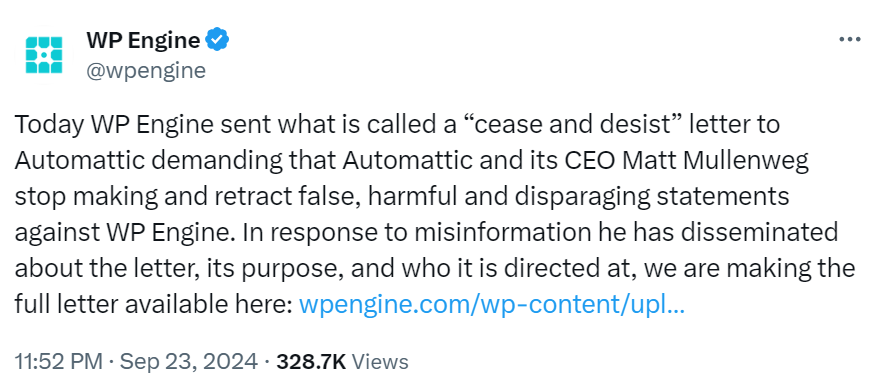
Automattic sent its own cease-and-desist letter back to WP Engine on the same day, “outlining WP Engine’s pattern of unauthorized usage of the WordPress and WooCommerce trademarks.” While WP Engine presented valid arguments, it’s tough to battle a company as powerful as WordPress.
➡️ September 21, 2024: Matt Mullenweg calls WP Engine “a cancer to WordPress”
After the backlash from Mullenweg’s WordCamp US speech, Mullenweg doubled down and shared a blog post titled “WP Engine is not WordPress”. In this, he spoke about the confusion customers face with the existence of the WP Engine brand, arguing many believe that WP Engine is a part of WordPress.
Mullenweg went on to say:
“What WP Engine gives you is not WordPress, it’s something that they’ve chopped up, hacked, butchered to look like WordPress, but actually they’re giving you a cheap knock-off and charging you more for it.
This is one of the many reasons they are a cancer to WordPress, and it’s important to remember that unchecked, cancer will spread. WP Engine is setting a poor standard that others may look at and think is ok to replicate. We must set a higher standard to ensure WordPress is here for the next 100 years.”
➡️ September 20, 2024: Matt Mullenweg criticizes WP Engine at WordCamp US
The WordPress and WP Engine drama began during this year’s WordCamp US when Matt Mullenweg spoke negatively about WP Engine. In his keynote address, Mullenweg called out WP Engine for not contributing to WordPress’ development.
A WordPress blog post following the event suggested that the volatile speech came about after WP Engine failed to comply with demands set out by Mullenweg. These demands included WP Engine handing over 8% of its revenue every month in order to use the WordPress name. WP Engine refused to accept Automattic’s steep requirements, triggering Mullenweg’s self-described “scorched earth nuclear approach” against WP Engine.
You can watch the entire WordCamp stream to watch Mullenweg’s keynote speech in full:



Leave a comment